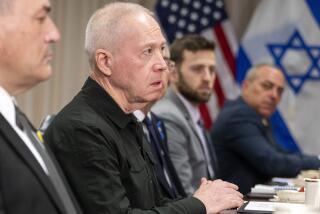Bush weighs Iraq war options amid pressure
- Share via
WASHINGTON — President Bush met with top generals and national security advisors Saturday to review the situation in Iraq, as pressure grows from Republican and Democratic leaders for a new approach in handling the war.
“The participants focused on the nature of the enemy, the challenges in Iraq, how to better pursue our strategy, and the stakes of succeeding for the region and the security of the American people,” said spokeswoman Nicole Guillemard, who added that the meeting at the White House was the third in a series of consultations between the president and the generals.
Bush consulted for 90 minutes with his security team, including Army Gen. John P. Abizaid, the top U.S. commander in the Middle East, Defense Secretary Donald H. Rumsfeld and national security advisor Stephen J. Hadley. Army Gen. George W. Casey Jr., the commander of U.S. forces in Iraq, Vice President Dick Cheney and the U.S. ambassador to Iraq, Zalmay Khalilzad, participated by videoconference.
In his Saturday radio address, Bush said he was reviewing tactical changes, not strategic ones. “Our goal in Iraq is clear and unchanging -- our goal is victory,” he said. “What is changing are the tactics we use to achieve that goal.”
In the Democratic response, congressional candidate Diane Farrell of Connecticut, who is challenging Rep. Christopher Shays, called for a new direction in the war. Democrats, she said, plan to “hold the president accountable” for the course of the Iraq war if they win control of Congress next month.
“Our troops deserve from their leaders in Washington nothing short of a commitment equal to the dedication the troops bring to their duty every day,” Farrell said. “Instead, they get a flat denial of the horrible reality.”
Shays split with Bush last month over whether to set a timetable for withdrawing U.S. troops, and held hearings to explore the idea.
For months, the Pentagon has been coordinating with the Iraqis on a series of measures they could take to assume greater control of their country. In recent interviews, senior Pentagon officials have expressed frustration with the government of Prime Minister Nouri Maliki.
But the White House termed “not accurate” a report in the New York Times suggesting that the Pentagon was developing timetables for Iraq to assume a larger role in security. A senior administration official said, “This issue did not come up this morning during the meeting.”
In his radio address, Bush said U.S. commanders on the ground “are constantly adjusting their approach to stay ahead of the enemy, particularly in Baghdad.”
He remained insistent, however, on the goal of U.S. intervention. “There is one thing we will not do,” he said. “We will not pull our troops off the battlefield before the mission is complete.”
The meetings came at the end of a week of increasing violence and after the acknowledgment Thursday by Maj. Gen. William B. Caldwell IV that the operation to secure Baghdad has “not met our overall expectations.” The U.S. death toll so far this month stands at 78, and October is likely to have the highest monthly total in nearly a year.
“The last few weeks have been rough for our troops in Iraq, and for the Iraqi people,” said Bush, who blamed the increased violence in part on insurgents “trying to influence public opinion here in the United States.”
Meanwhile, Alberto Fernandez, director of public diplomacy in the State Department’s Near Eastern Affairs Bureau, told the Arabic satellite channel Al Jazeera on Saturday that critics of the U.S. war had some grounds for concern. “There is much room for criticism because, undoubtedly, there was arrogance and there was stupidity from the United States in Iraq,” he said.
julian.barnes@latimes.com
The Associated Press was used in compiling this report.
More to Read
Sign up for Essential California
The most important California stories and recommendations in your inbox every morning.
You may occasionally receive promotional content from the Los Angeles Times.













